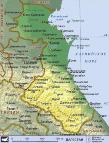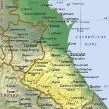
Dagestan’s Sharia Jamaat Suffers Series of Setbacks
Publication: North Caucasus Weekly Volume: 10 Issue: 6
By:

Events in the Republic of Dagestan—one of the most unstable republics in the North Caucasus region—are again demanding attention. This time, however, what is noteworthy are not the usual reports of daily armed clashes, but the news propagated by the Russian mass media concerning the death of the recently appointed leader of the Dagestani Sharia Jamaat, Emir Muaz.
The people of Dagestan are predominantly Muslim and the republic is situated in a strategically important region in the Russian south. Since Dagestan borders Azerbaijan, Georgia and the Chechen Republic, the republic has always been the object of Moscow’s special attention.
The Russian mass media reported that Emir Muaz (Omar Sheikhulaev, b. 1975) was killed during a special operation carried out on February 5 in the settlement of Leninkent, a suburb of Dagestan’s capital, Makhachkala (Regions.ru, February 5). Emir Muaz was appointed by the Chechen leader of the Caucasus resistance movement, Dokku Umarov, in early December 2008 to replace the Sharia Jamaat’s slain leader Abdul-Mejid (also known as Ilgar Malachiev, who was killed on September 8, 2008, during an operation carried out jointly by the special services of Russia and Azerbaijan).
During the February 5 special operation in the Makhachkala suburbs, three Sharia Jamaat members died along with Emir Muaz, including Makhach Magomedov, Aslan Aldaev and Nazim Mursalov. Russian sources officially reported that two police officers were wounded during the operation but, as is often the case, these figures may have been deliberately deflated.
On February 7, Kavkaz-Center, the official mouthpiece of the Caucasus Emirate released a statement confirming the death of the Dagestani jamaat’s leader. The statement indicated that Emir Muaz had joined the war in 2002, initially serving under the leadership of Emir Muslim and subsequently fighting alongside Rappani Khalilov (also known as Emir Rabbani). Despite the death of Emir Muaz, the members of the Sharia Jamaat declared that the “jihad continues,” which implies that their leader’s death will have no impact on the Dagestani jamaat’s plans. Taking into account the deaths of previous leaders of the Sharia Jamaat, it is possible to predict that the jamaat members’ vow will most likely be carried out.
Against the backdrop of daily losses among its police forces as the result of actions by Sharia Jamaat members across Dagestan, the death of the jamaat’s leader is undoubtedly good news for the Dagestani Interior Ministry, which considered Emir Muaz its ‘enemy number one’. The Russian news agencies were quick to attribute all the major assassinations carried out in Dagestan over the past couple of years to the slain jamaat leader. This has become a sort of tradition in Russian jurisprudence, with each slain resistance fighter becoming the person responsible for a dozen crimes, and this practice is repeated year after year, while different people (including people of different nationalities) are routinely thrown into jail for the same crime in various parts of the North Caucasus.
As has been repeatedly noted in previous articles, the Dagestani jamaat became the most viable of all the jamaats. Its actions simply cannot be compared to those of other jamaats, including the Ingush Sharia Jamaat (led by Emir Magas). Since Dagestan is the largest and most populous republic in the North Caucasus, Moscow is forced to deploy a large number of regular troops there, plus forces of the federal Interior Ministry as well as the special operations forces of the Federal Security Service (FSB). Yet, in spite of that, militant actions are becoming increasingly brazen.
Some 96 armed assaults on law enforcement authorities were carried out in Dagestan last year (Kavkazky Uzel, December 24, 2008). Since December, when Emir Muaz was appointed leader of Dagestan’s Sharia Jamaat, it has carried out a number of assaults against representatives of the authorities. Especially notable among them was the assassination of Valery Lipinsky, deputy chief of the headquarters of the federal Interior Ministry forces’ North Caucasian Regional Command, on December 29, 2008, in Makhachkala, Dagestan’s capital (Newsru.com January 11). Similarly daring was the execution of five people on February 1. These included the head of Dagestan’s Untsukul district, Kazimbek Akhmedov; an officer from the Directorate of Economic Crime of Dagestan’s Interior Ministry, Omaraskhab Omaraskhabov; and the deputy imam of Makhachkala’s main mosque, Magomed Magomedov (Vremya Novostei, February 3).
According to Dagestan’s Interior Ministry, the militants targeted the head of the district administration most likely in response to the anti-terrorist operation that was carried out in the Untsukul district, and more specifically in the vicinity of the village of Gimry, from December 2007 to August 2008. This may have provided the militants with a sufficient rationale to carry out a reprisal attack against the head of the local administration for his collaboration with the authorities. Many explosions were registered in different locales, including the city of Khasavyurt, where a number of operatives from the municipal department of the republic’s Interior Ministry were wounded as a result of attacks carried out on January 1, 2 and 14. According to sources in the Caucasus Emirate, the municipal Internal Affairs directorate for the city of Khasavyurt came under attack on January 21, but there have been no other reports confirming this incident. Numerous reports appeared in the mass media about police and FSB personnel wounded during special operations aimed at neutralizing the militants, but they do not always correspond with the figures cited by the Caucasus Emirate’s sources.
Among the considerable losses for the jamaat during this period, it is important to note the death of Isa Khadiev on January 17. He was known as the former head of the Shurah of Alims of the People of the Caucasus. Equal in importance was the death of the Emir of the Khasavyurt Sector of Armed Forces of the Caucasus Emirate, Emir Umalat, who died in Khasavyurt on January 20.
Although the death of the jamaat leader, Emir Muaz, was very bad news for the jamaat members (as it was for the entire armed resistance movement of the region), it will not have any measurable impact on the overall situation within the jamaat. The internal dynamics of the jamaat no longer depend on any one personality, because its structure has been forged over the years and it allows many different groups to function independently of each other. The new leader of the Sharia Jamaat will probably be appointed no later than March-April. He is always chosen by the jamaat members, but his approval and formal appointment will take place only after a corresponding decision is made by the Emir of the Caucasus Emirate, Dokku Umarov. Following Umarov’s decision, the new Emir, who personifies the jamaat, will have to take an oath of allegiance (bayat) to Umarov. By doing so the jamaat members will once again underscore Umarov as the main leader of the entire North Caucasian armed resistance movement. The new jamaat leader will also carry the title of vali (ruler) of the vilayat of Dagestan (province of Dagestan) within the structures of the Caucasus Emirate.
In order to somehow justify its incompetence concerning the neutralization of all the Sharia Jamaat’s members, the official Russian state propaganda machine already began to blame everything on the special services of foreign countries. Thus, according to Russian Deputy Interior Minister Arkady Yedelev, the members of the international terrorist organization al-Qaeda are apparently operating on the territory of Chechnya and Dagestan (www.solovei.info/topnews/10975.html). Similar references are made to interference by foreign countries. Although it is not specified which foreign countries or structures are carrying out the aforementioned interference, it is not hard to figure out that everything is attributed to the United States. As Yedelev noted in his statement, just like the August war in Georgia, “the plans of foreign special services will be foiled”—an apparent reference to what Moscow sees as American plans for the Caucasus region in general.




